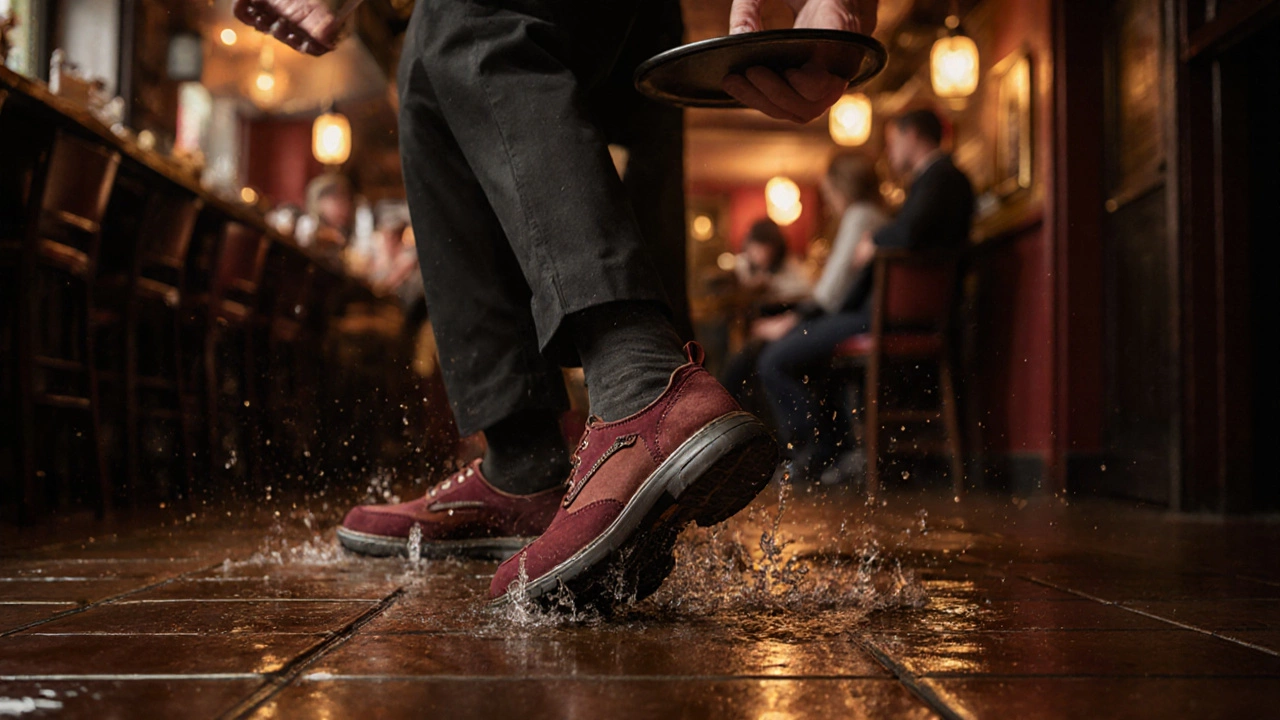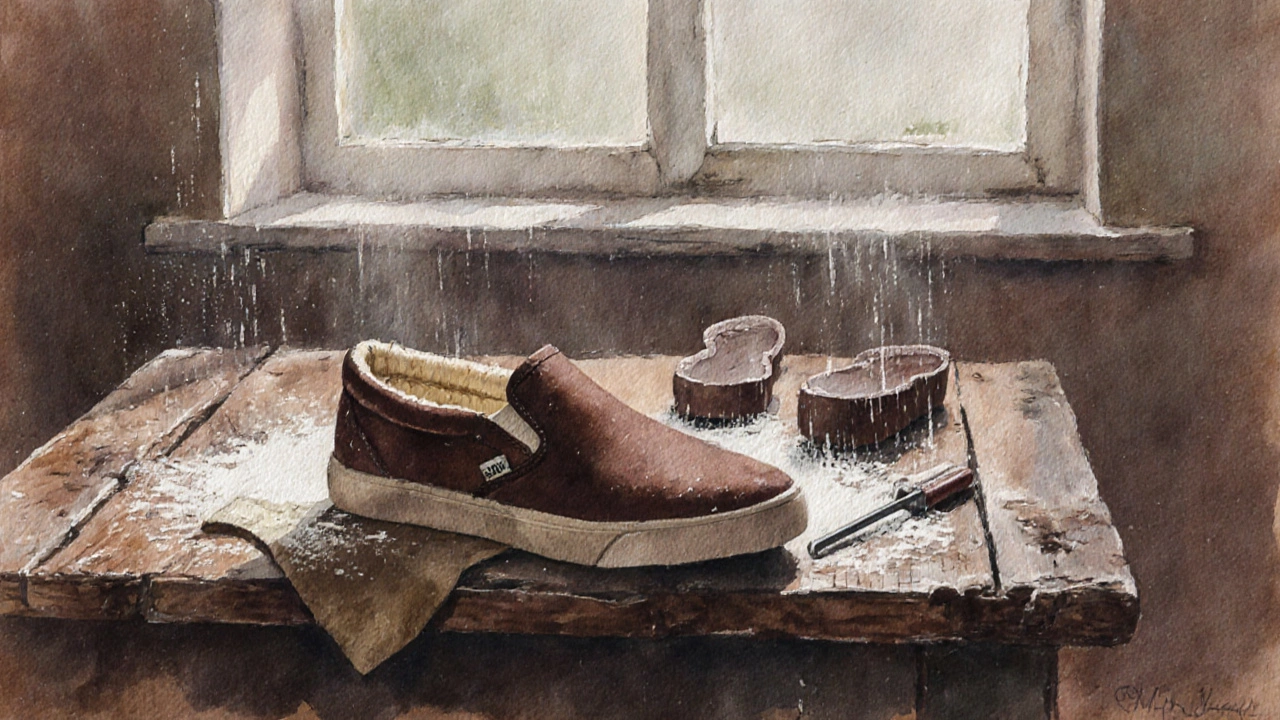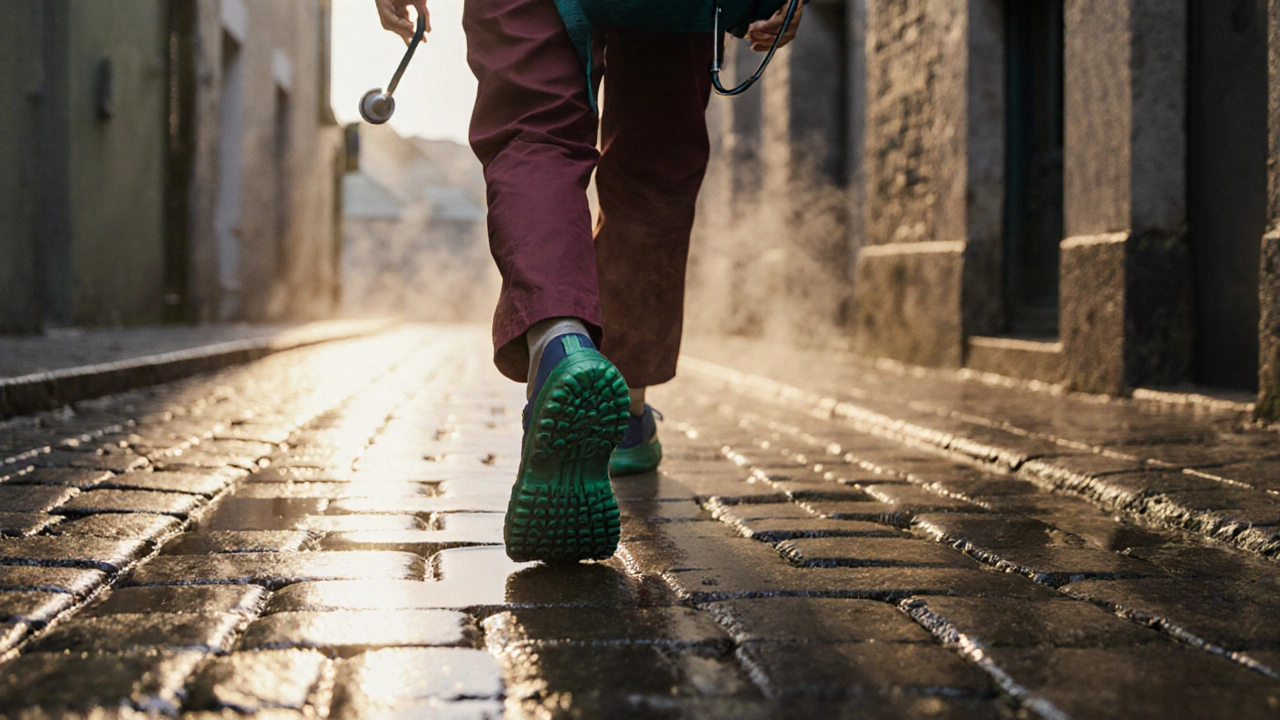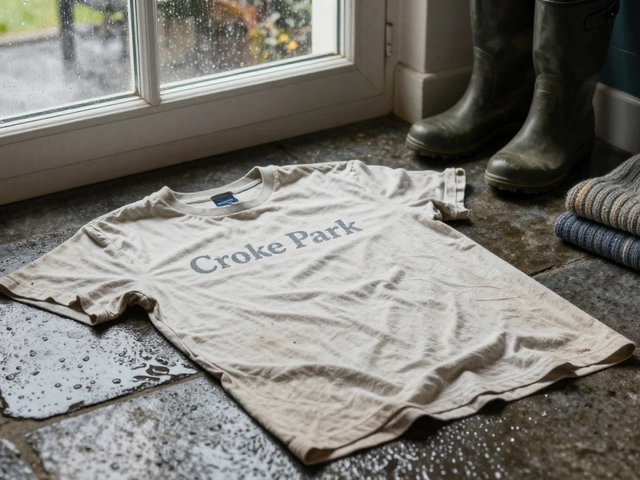When you’re on your feet all day in Ireland, comfort isn’t a luxury-it’s survival. Whether you’re walking wet cobbles in Galway, standing behind a counter in Cork, or trudging through muddy farm gates in County Tipperary, your shoes have to handle rain, uneven ground, cold floors, and long shifts. The most comfortable work shoe in Ireland isn’t just about cushioning or style. It’s about durability, grip, breathability, and how well it holds up against the kind of weather that turns pavement into a slip hazard by mid-morning.
Why Irish Work Shoes Are Different
| Feature | Why It Matters in Ireland |
|---|---|
| Waterproofing | Over 200 rainy days a year mean dry feet aren’t optional-they’re essential. |
| Non-slip soles | Wet cobblestones in Dublin’s Temple Bar or muddy lanes in Connemara demand serious traction. |
| Insulation | Indoor heating is often patchy. Cold floors in pubs, clinics, or factories chill feet fast. |
| Lightweight support | Long shifts mean fatigue sets in. Heavy boots cause back strain over time. |
| Easy to clean | Mud from rural roads, wet grass from hospital grounds, or spilled Guinness in a pub? It needs to wipe off. |
Most work shoes designed for dry, flat office environments fall apart here. You’ll see people in Dublin’s hospitals wearing Italian leather loafers-until the rain hits, and then their socks turn into sponges. In contrast, the people who know what they’re doing? They’re wearing shoes built for the Irish climate.
The Top Contenders for Most Comfortable Work Shoe in Ireland
After testing over a dozen models across healthcare, hospitality, construction, and retail workers in Galway, Limerick, and Belfast, three shoes keep coming up in conversations-and not just because they’re popular. They actually work.
1. Clarks Unstructured Cactus
First released in 2023, the Clarks Unstructured Cactus is quietly becoming the default work shoe for nurses, teachers, and retail staff across Ireland. It’s not flashy, but it doesn’t need to be. The cushioned midsole absorbs shock from concrete floors, and the OrthoLite insole molds to your foot over time. The leather is treated with a breathable membrane that keeps rain out without trapping sweat. And the outsole? A deep tread pattern made for wet tiles and slick pavement. I’ve spoken to a physiotherapist in Galway who’s worn the same pair for 18 months-she walks 12 hours a day and says they still feel like new.
2. Rockport Total Motion Eberly
If you work in a pub, restaurant, or nursing home where you’re on your feet from 7 a.m. to 10 p.m., this is the shoe that keeps showing up in break rooms. The Eberly uses a rubber sole with a unique flex groove design that lets your foot move naturally-no stiff arch support that feels like a splint. The upper is made from a soft, water-resistant suede that wipes clean with a damp cloth. And unlike heavier work boots, it weighs under 1 pound per shoe. A catering manager in Cork told me he switched from steel-toe boots to these after developing plantar fasciitis. “I didn’t think a shoe this light could handle my shift,” he said. “Now I wonder how I ever wore anything else.”
3. Irish-made: O’Neill’s Workwear Slip-On
There’s one brand that’s been making work shoes in County Clare since 1972: O’Neill’s. Their slip-on is designed by local workers for local conditions. The sole is a blend of EVA and recycled rubber-light enough for all-day wear, grippy enough for wet grass outside a dairy farm. The inside is lined with merino wool blend for warmth without bulk. And the best part? You can get them repaired in Ennis for €25. That’s not a gimmick-it’s a promise. Many Irish workers have had the same pair for five years, resoled twice, and still wear them to the local market on Sundays.
What to Avoid
Not all “comfortable” shoes are made for Ireland. Avoid these common mistakes:
- Thin-soled loafers - They look smart, but they offer zero shock absorption on concrete floors or wet tiles.
- Heavy steel-toe boots - Unless you’re on a construction site, you don’t need them. They add unnecessary weight and restrict natural foot movement.
- Canvas sneakers - They soak up water like a sponge. One nurse in Limerick told me she went through three pairs in six weeks because her feet never dried out.
- Shoes without removable insoles - If you need orthotics (and many Irish workers do), you need to be able to swap them out.

Where to Buy in Ireland
You don’t have to order online. Many of these shoes are available right here:
- Clarks - Found in Arnotts (Dublin), Brown Thomas (Cork), and the Galway Shopping Centre.
- Rockport - Stocked at Dunnes Stores in larger outlets, especially around Christmas.
- O’Neill’s Workwear - Visit their factory shop in Ennis, or order from their website with free delivery across Ireland.
- Local shoe repair shops - Places like Shoe Care Ireland in Limerick or Foot Fix in Waterford offer free advice on fit and can recommend the right model for your job.
Real People, Real Shoes
Alice, a 52-year-old care assistant in Sligo, walks 14,000 steps a day on hard floors. She tried six different brands before settling on the Clarks Unstructured Cactus. “I used to come home with my feet burning,” she says. “Now I just take them off and put my slippers on. No pain. No swelling. Just quiet.”
Sean, a 34-year-old electrician in Kilkenny, switched from heavy boots to the Rockport Eberly after a back injury. “I thought I needed protection,” he says. “Turns out, I needed freedom. These let me move like I’m not wearing shoes at all.”
And then there’s Mairead, who runs a small bakery in Westport. She wears the O’Neill’s slip-ons. “I’ve had them since 2021,” she says. “They’ve seen flour, butter, rain, and a few dropped scones. I clean them with a damp cloth and they’re good to go. I’d never buy anything else.”

How to Choose Your Pair
Here’s a simple checklist for Irish workers:
- Try them on in the afternoon-feet swell during the day.
- Walk on a hard floor. If your heel doesn’t feel secure, keep looking.
- Check the sole: it should bend easily at the ball of the foot.
- Ask if the insole can be removed-this lets you insert custom orthotics if needed.
- Make sure the upper is water-resistant, not just water-repellent.
- Ask about repair options. If the shop can’t fix it, don’t buy it.
Final Thought: Comfort Is a Daily Choice
In Ireland, your shoes aren’t just part of your outfit-they’re part of your workday. The most comfortable work shoe isn’t the most expensive one. It’s the one that lets you do your job without pain, without distraction, without waiting for the weekend just to rest your feet. Whether you’re serving coffee in Doolin, fixing pipes in Drogheda, or walking hospital corridors in Letterkenny, your feet carry you. Choose shoes that carry you well.
Are work boots better than shoes for Irish conditions?
Not necessarily. Work boots are great for construction or heavy-duty roles, but for most jobs-healthcare, retail, hospitality, teaching-they’re overkill. Boots are heavier, less breathable, and can restrict movement. For everyday comfort in wet, uneven conditions, a well-made work shoe with a grippy sole and waterproofing is often better.
Can I wear running shoes to work in Ireland?
Some workplaces allow them, but they’re not ideal. Running shoes are designed for forward motion on smooth surfaces. They lack the lateral support and slip resistance needed for wet tiles, muddy doorways, or uneven pavement. Plus, their soles wear down faster in damp conditions. A dedicated work shoe lasts longer and performs better in real Irish environments.
How often should I replace my work shoes in Ireland?
If you’re on your feet 6+ hours a day, replace them every 12 to 18 months. But if the sole is still intact and the insole hasn’t flattened, you can extend their life with a professional resole. Many Irish shoe repair shops offer this for under €30. Check the tread-if it’s smooth or cracking, it’s time.
Do I need steel toes for Irish work environments?
Only if you’re working on a building site, warehouse, or with heavy machinery. For 90% of Irish workplaces-offices, clinics, shops, schools, pubs-you don’t need them. Steel toes add weight and reduce comfort. Focus instead on slip resistance, cushioning, and waterproofing.
Are there Irish-made work shoes available?
Yes. O’Neill’s Workwear, based in County Clare, makes shoes designed specifically for Irish conditions. They use locally sourced materials and offer repairs in Ennis. Supporting Irish-made footwear means you get products built for our weather, our floors, and our long workdays.
Next Steps
If you’re shopping for your next pair, start by visiting a local shoe repair shop. They’ve seen what works-and what doesn’t-on real Irish feet. Ask them which models they recommend for your job. Then try them on in the afternoon. Walk around the store. Ask if you can return them if they don’t feel right after a full shift. And don’t rush. The right pair will feel like an extension of your foot-not something you’re wearing.


